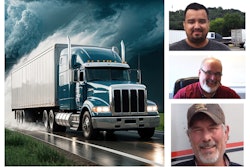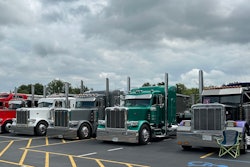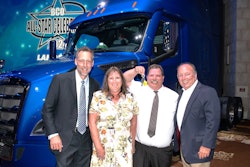All hail the humble warehouse bullpen!
 C&S Wholesale Grocers, Plant City, Florida
C&S Wholesale Grocers, Plant City, Florida
Safe haven at the end of a hard run. Home of peaceful microwave dinners, endless hours on Netflix, and, in my case, stories like this one.
Last week, I was surprised by the kindness of an elderly security guard at C&S Wholesale Grocers in Plant City, Florida. It had been a tight run getting down there from Indiana and I arrived that night with just 7 minutes left of my 11 hours of drive time. After I was safely parked in their bullpen, I brought my bills to the guard house.
The guard said, “We want you to know that once you’ve unloaded, if you’re still tired, you’re more than welcome to return to our bullpen and rest some more.”
I was taken aback by this statement of basic human decency.
There are two things I believe that are essential to being a successful reefer hauler.
- It’s imperative that you come from a dysfunctional family, and …
- That you carry no expectation of basic human decency with you into the workplace.
Those may sound like jokes, but to me they’re really not. Ever seen a Teamster or someone from a private fleet transition into reefer work? Someone with a basic framework of encoded rights? It usually doesn’t work out so well. I wound up chatting with that security guard to get to know his story.
“I used to work for [another grocery warehouse] up the road,” he said. “They would let drivers park before they unloaded, but they would make me roust them out of there if they returned to the bullpen after unloading. I hated every minute of my time there.”

I thought to myself, "Wow. What a diamond in the rough, this guy.” But after unloading the next morning, on my way out of the facility I encountered yet another elderly security guard. (God bless the Central Florida workforce.) As he cleared me to leave, he said, “We want you to know that if you’re still sleepy, you’re welcome to return to our bullpen. You’re welcome to rest there as long as you feel you need.”
Wait, what? So, was this baked-in corporate policy? Someone over there must have seen the light, and it was a beautiful thing to behold. I’m not sure how they found that light, but at this particular moment I didn’t really care.
I wasn’t sure whether to start crying or hug the kindly old guard.
[Related: Survey says: Paid truck parking not utilized, resented by many truckers]
Instead, I thanked him profusely and eased over to Fred’s Market Restaurant to regroup at the buffet. Fred’s Market Restaurant, Plant City, Florida, is, hands down, the greatest restaurant in the United States where you can park a tractor-trailer. Sometimes, I just feel like a better person for having eaten there.
On my second plate of meatloaf and green beans, I had a revelation. “Why can’t everyone be like C&S, Plant City?” I asked myself.
Why can’t they just make some kind of zoning law that requires every new warehouse being built in the U.S. to include a bullpen?
Shopping centers with 100-150 parking spots are required by law to provide at least five handicap-accessible spaces. Hospitals are required by OSHA to have adequate backup generators. Why aren’t mega-warehouse builders like Amazon being required by the appropriate government agency to make room for their incoming truckers?
So I asked a panel of trucking stakeholders just what they thought about my idea. Here’s what they had to say:
Brett DeWall
 Brett DeWall
Brett DeWall
I don't feel we need more regulation. The government is already burdened down with a lot of regulation they selectively enforce.
The work needs to be done by the carriers to let the customer know, "This is what we require to do business with you."
I agree with what a great feeling it is to get to a shipper, and be able to park there at will. This is a huge safety aspect for everyone involved.
Justin Sealy
 Justin Sealy
Justin Sealy
I’m 40 years old. I’ve been in this industry for 20 years.
I find it sad that I had to be taught how to ghost park in other [distribution centers] just because there wasn’t adequate parking where I was delivering. [When] I was in the specialized business, I barely worried about any of this. Nine out of ten military bases would let you park in their holding lots.
We all know there’s a parking shortage in this industry. Would it be cool to have that mandated? Yeah.
Will it work? Probably not.
Desiree Wood
 Desiree Wood
Desiree Wood
This topic has come up so many times during USDOT/FHWA Truck Parking Coalition workshops, state DOT freight advisory committee meetings and various Metropolitan Planning Organization (MPO) meetings.
[Related: How to fight for your right to park the truck]
When Jason Rivenburg was murdered in 2009 and his widow Hope Rivenburg launched the Jason's Law movement, the issue of his murder was a direct result of not being able to park on-site at the Food Lion distribution center facility in a town where no authorized safe truck parking existed.
I've said this for so many years, as have others, but somehow the local education on this subject matter has been lacking. The federal government, the state DOTs, the MPOs all know about the truck parking issue thanks to Jason Law, but at a local level and within economic development agencies there is still little understanding. If they let certain companies into their community thinking, "Yeah, this is great. We are creating hundreds or thousands of jobs," they do not connect that they are also bringing a whole bunch of truck traffic to their infrastructure, trucks that need to park in their community.
Instead of zoning accordingly for it, they are doing the opposite. I believe if some of these communities knew who the bad actors are beforehand and had a better understanding of what the big picture is when they invite Amazon to town, or others like them, they would negotiate accordingly and would learn to zone the new industrial construction in order to keep the trucks where trucks should be.
This has to be done in advance. Once those industrial park tenants are moved in and trucks are all over the place it’s too late to put much pressure on them, especially if the site was designed and constructed in a way that the tenant can say, "Well, we don't have room for it now," and the community already zoned curb space for no truck parking.
We really need more local education at the city level to humanize this issue. To understand we are community members, your neighbors, and we need some help here on this to get the shippers and receivers to do their part. Hold them accountable. We need a place to park and we need a place to go to the bathroom. We are not animals. Some common courtesy is in order in the supply chain, and the ATA has been responsible for not calling out the bad actors and letting them evade accountability on this and the unpaid detention issue, too.
Dan Moeller
Experience: Company driver (reefer), Safety Director of Moeller Trucking
 Dan Moeller
Dan Moeller
With that being said there are also a lot of things I would say OTR drivers would need to change as well. … I could go on for a while about this crazy industry that we are all a part of! Ha!
Jeff Clark
Experience: Owner-operator, company driver (reefer, dry van)
I have always believed that if someone is big enough to order a truckload of anything, they are big enough to provide a parking place for that equipment. There are several phrases that always came to mind during my career. One of them is mutual benefit. I always wanted anyone that I did business with to be better off for it. Another one is overall efficiency.
Everyone benefits from efficiency. One of the great barriers to efficiency is a lack of pragmatic places to park a truck.
 Jeff Clark
Jeff Clark
In my career, I had a lot of repeat customers. The ones that I repeated the most were the ones that allowed me to park there. I actively avoided the ones that did not. Now, I completely understand that there are 3 million drivers out there, and the average career is about 3.2 years. Chances are pretty good that they will find another driver.
That driver isn’t me. With me, they knew that I would be there waiting and ready to go before my appointment time. If they could get me in early, great -- for both of us. There were many times when I had an 08:00 appointment and someone would miss a 07:00 appointment. Not only would I get empty early, but their schedule for the day could remain intact.
At the end of my career, I had one dedicated customer. I overnighted in their parking lot every Monday and Wednesday night. Not only was I allowed to sleep there, they gave me access to the building. That gave me access to indoor plumbing, and a microwave. I started before 03:00. There was no place open to get coffee, or use a restroom. No problem. I just microwaved a mug before I got started.
There was another benefit. My loads were multi-stop. Occasionally, they would get loaded in the wrong order. I was able to move pallets around and save at times a hundred driving miles.
When a customer allowed me to use their facility, it was a privilege. That is how I treated it. It is incumbent on the driver to leave a customer as clean as they found it. It is not a bad idea to leave it cleaner.
[Related: Weigh In: Should brokers be allowed to call you at 3 a.m.?]










